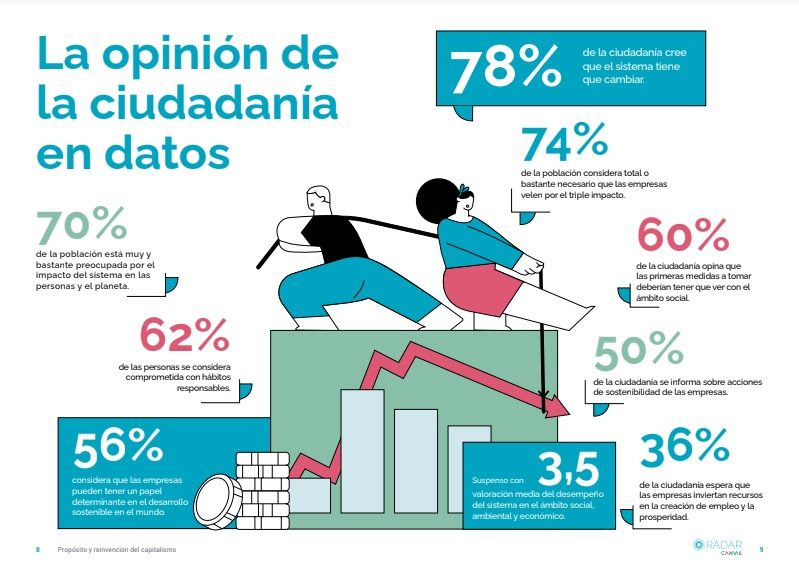
According to a study by CANVAS Sustainable Strategies, Spanish society shows a clear consensus that the capitalism, as an economic and social model, needs a profound transformation towards a system that cares more about people and the planet. But there is a clear mistrust that the organizations and entities of the current system undertake the necessary change to move towards a new model that provides a positive social and environmental impact and economic prosperity.
In the study, carried out based on a consultation of more than 1,000 people with a wide geographic and socioeconomic representation of the country, Spanish citizens fails, with an average of 4 out of 10, to the current socioeconomic system, an assessment shared by more than half of those consulted. In addition, 8 out of 10 people consider that capitalism needs a lot or a lot of transformation. thinking about the effects for the whole of society and the planet.
The areas in which citizens say they are most concerned about the negative impacts of the system are, in this order: caring for people (having a decent job and a decent life, health care, the fight against poverty and social inequality, and accessible education); caring for the environment (guaranteeing drinking water, promoting clean energy, taking care of the oceans and rivers, combating climate change and protecting natural ecosystems); and take care of the economy (above all, seek social equity and the proper distribution of resources, and at some distance favor industry, innovation and technological development).
Note that the query results show again Here is a broad consensus without intergenerational or socioeconomic differences, although a gender bias is perceived: women transmit their concern for social and environmental issues in a more forceful way.
Crisis of confidence in institutions
As for the system’s response to these concerns, 7 out of 10 people give it a failing rating (3.5 out of 10). and asked for their confidence in the role that institutions and organizations can play in this regard, the only one that approves is the educational field (schools, universities, scientific system), which obtains an average of 5.2 out of 10: 42% highlight its relevant role so that the capitalist system is transformed towards a model that ensures the impact positive in society and the planet.
On the opposite side are the political parties and leaders, as well as the Church and religious leaders, who obtain the lowest scores, below 3 out of 10. Also business leaders, the private sector as a whole and the Public administration they obtain scores of less than 4 out of 10, and international organizations, citizen movements and the media are close to passing.

“Institutions are suffering from a notable crisis of legitimacy, and this is a clear reflection of the need to promote new models of leadership. In this context, citizen movements are consolidated as referents of self-organized groups, as opposed to the model of the individual, which is intrinsic to the current socioeconomic system, and that greater confidence in supranational organizations. Credibility is deposited in the collective and in the global-local relationship”, explains Claudina Caramuti, co-founder and development director of CANVAS Sustainable Strategies.
Companies with purpose: a social demand
In the business sphere, one of the most demanded transformations is the transition from companies whose objective is exclusively economic benefit, to companies with a purpose, that is, that balance their income statement with generating a positive impact on society and the environment. In this sense, although there is no clear knowledge among citizens of what a company with a purpose means, 7 out of 10 people consider it totally or quite necessary that companies ensure that triple social, environmental and economic impact.
“Up to 74% of Spanish society believes that it is very necessary that there are companies with this new model for the transformation of the system, but they do not fully trust that this model is currently a reality. People want to believe in this purpose-driven business model, but are unsure if it’s real or just a front.” explains Isabel López, co-founder and CEO of CANVAS.
As for the sectors that are considered key to the transformation, the highest average valuations, with around 6 out of 10, They are obtained by those related to energy, transport, technology and the chemical and pharmaceutical industry. In a second block are sectors such as food, telecommunications, tourism, shops, construction, textiles and extractive industries. And in the block with a lower valuation regarding the role they are going to play in the future are financial services, insurance and professional services.
Finally, when asked where companies with a purpose should invest, citizens chose as their first option, with a large majority (36.2%), job creation and prosperity, a concept that is repeated as a common thread throughout the report.



